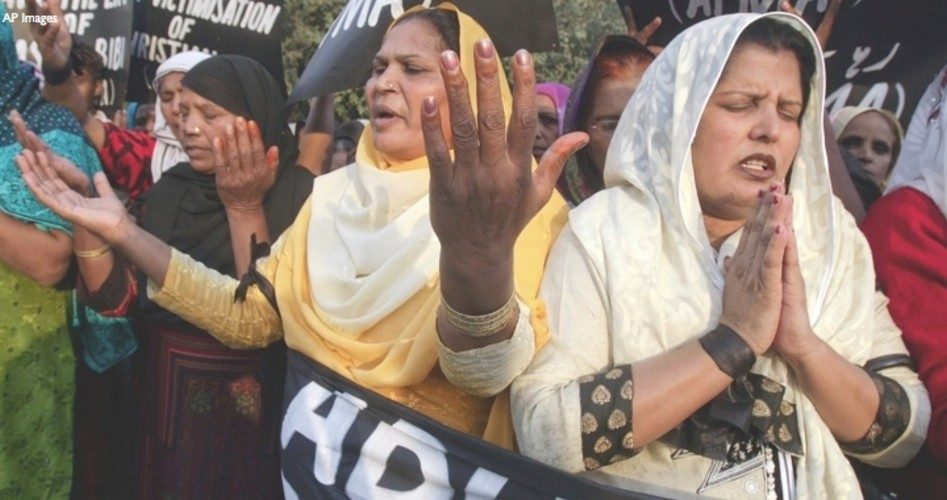
New concerns have been raised around the globe that the plight of the world’s most brutally persecuted religion has not been sufficiently addressed by world leaders, and that the persecution which confronts that faith is growing worse each year. That persecuted faith is Christianity.
A recent article for the Christian Post gives a sense of the level of persecution which confronts Christians around the world:
Dr. Carl Moeller told The Christian Post at an event on rising religious intolerance abroad that Christians are “the most persecuted in the world” when the nonprofit examined religious groups suffering from increased persecution.
“In terms of sheer numbers, the large size of the Christian populations around the world, where they’re repressed or restricted… Whether you count martyrs, those killed, or you count those living in regimes, sizable Christian populations live under extreme restrictions in places like China, Indonesia, and of course the Middle East,” said Moeller.
The fact of widespread anti-Christian persecution is hardly disputable; in August 2011, The Pew Forum on Religion and Public Life issued a report demonstrating that the restrictions faced by practitioners of various religions was dramatically on the rise:
Restrictions on religious beliefs and practices rose between mid-2006 and mid-2009 in 23 of the world’s 198 countries (12%), decreased in 12 countries (6%) and remained essentially unchanged in 163 countries (82%), according to a new study by the Pew Research Center’s Forum on Religion & Public Life.
Because several countries with increasing restrictions on religion are very populous, however, the increases affected a much larger share of people than of states. More than 2.2 billion people — nearly a third (32%) of the world’s total population of 6.9 billion — live in countries where either government restrictions on religion or social hostilities involving religion rose substantially over the three-year period studied. Only about 1% of the world’s population lives in countries where government restrictions or social hostilities declined.
Among the world’s 25 most populous countries — which account for about 75% of the world’s total population — restrictions on religion substantially increased in eight countries and did not substantially decrease in any. In China, Nigeria, Russia, Thailand, the United Kingdom and Vietnam, the increases were due primarily to rising levels of social hostilities involving religion. In Egypt and France, the increases were mainly the result of government restrictions. The rest of the 25 most populous countries, including the United States, did not experience substantial changes in either social hostilities or government-imposed restrictions.
Under the International Religious Freedom Act of 1998, a series of annual reports to Congress began, and a United States Commission on International Religious Freedom was established during the Bush administration.
As of April 2011, Patrick Goodenough of CNSNews reported that the Obama administration had not as yet designated a single “country of particular concern,” while the previous administration had identified eight such countries mere days before the end of Bush’s second term:
Despite the strong urging of Washington’s religious rights watchdog, the Obama administration has not designated a single “country of particular concern” (CPC) for religious freedom violations since taking office 27 months ago.
The last time any country was designated as a CPC was on January 16, 2009 — four days before President Bush left office. On that day, then Secretary of State Condoleezza Rice named as CPCs eight countries — Burma, China, Eritrea, Iran, North Korea, Saudi Arabia, Sudan, and Uzbekistan. All had been designated previously.
Despite the Obama administration’s inaction, those eight still stand, although some actions resulting from the designations have expired.
Today, 16 nations are on the list of “countries of particular concern” — and it is a “who’s who” of Islamist and Communist states, where the primary targets of religious persecution are often Christians. As Fiorello Provera (the vice chair of the Foreign Affairs Committee of the European Parliament) wrote in a recent article:
In almost every part of the world, reports emerge on a daily basis of Christian communities falling victim to harassment and persecution. …
In 2012, the organization Open Doors, which is devoted to focusing on the plight of Christians, designated Muslim-majority countries ― including Afghanistan, Saudi Arabia, and even the Maldives ― as some of the world’s worst offenders. In Pakistan, the country’s notorious blasphemy laws are frequently used against Christians to settle personal scores or extort financial gain. The shocking assassinations of Shahbaz Bhatti, Pakistan’s minister for minority affairs, and the governor of Punjab province, Salmaan Taseer, ensured that anyone who speaks out on this topic can expect swift retribution.
Yet the problem is not limited to the Muslim world. In China, according to the organization The Voice of the Martyrs, persecution of Christians rose significantly from 2010 to 2011. Unofficial house churches are especially vulnerable to official harassment or raids by the authorities. …
There is an obvious reticence by international bodies even to acknowledge the problem. But according to the Pew Forum, at least 10 percent of the world’s Christians ― 200 million people in 133 countries ― live in societies as a minority group. Unless action is taken to address the issue, hundreds of communities that simply wish to practice their religion peacefully will face profound psychological and demographic consequences, fleeing into exile to preserve their faith.
As President Obama grapples with the “evolution” of his stance on gay “marriage,” matters of genuine persecution remain unaddressed. The Canadian government is preparing to follow in the footsteps of the Bush administration and establish its own Office of Religious Freedom, but now the President of one of the largest Christian nations in the world remains silent on the persecution endured by millions of Christians.
Photo: Supporters of All Pakistan Minorities Alliance pray during a rally against blasphemy laws and demanding to release a Christian woman Asia Bibi who is sentenced to death, Nov. 21, 2010, in Lahore, Pakistan : AP Images


